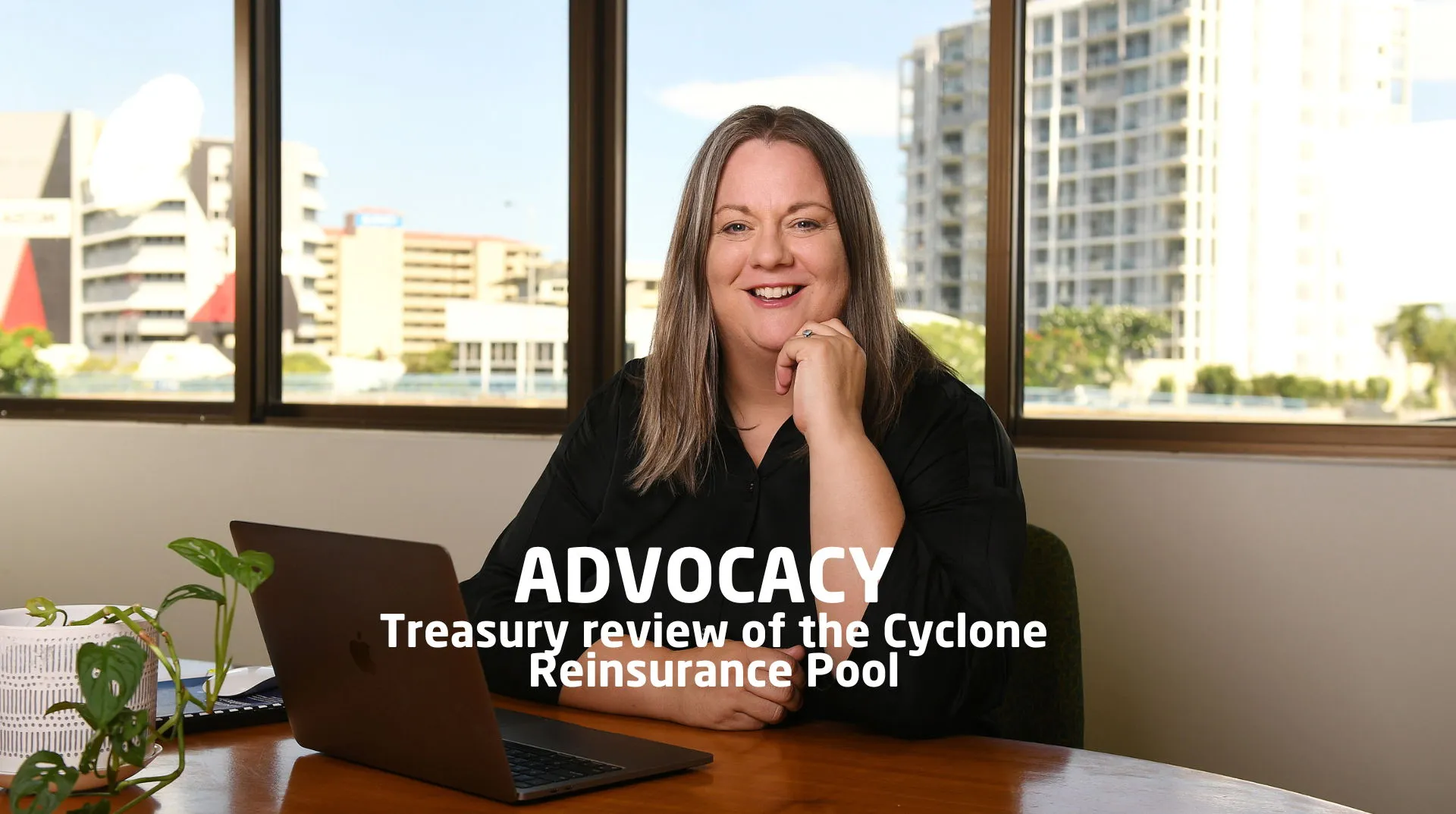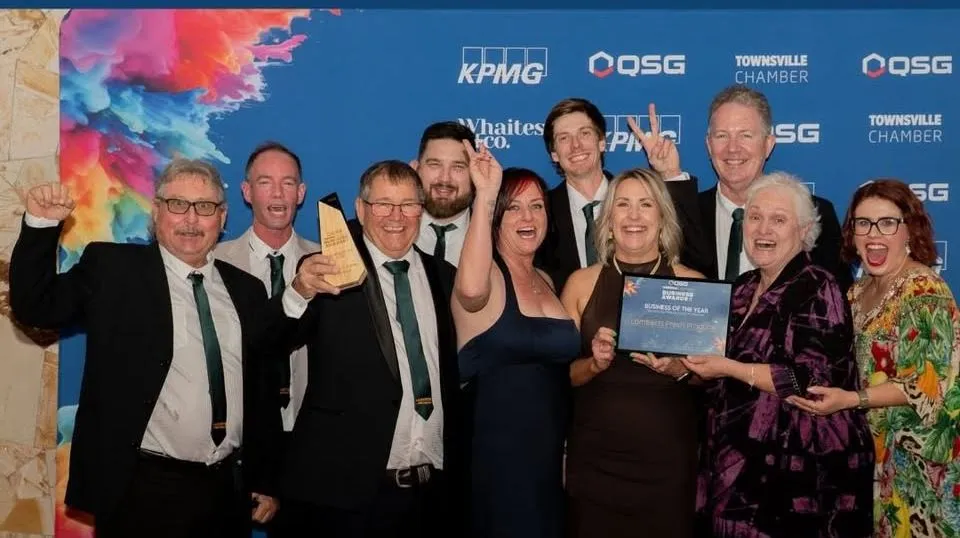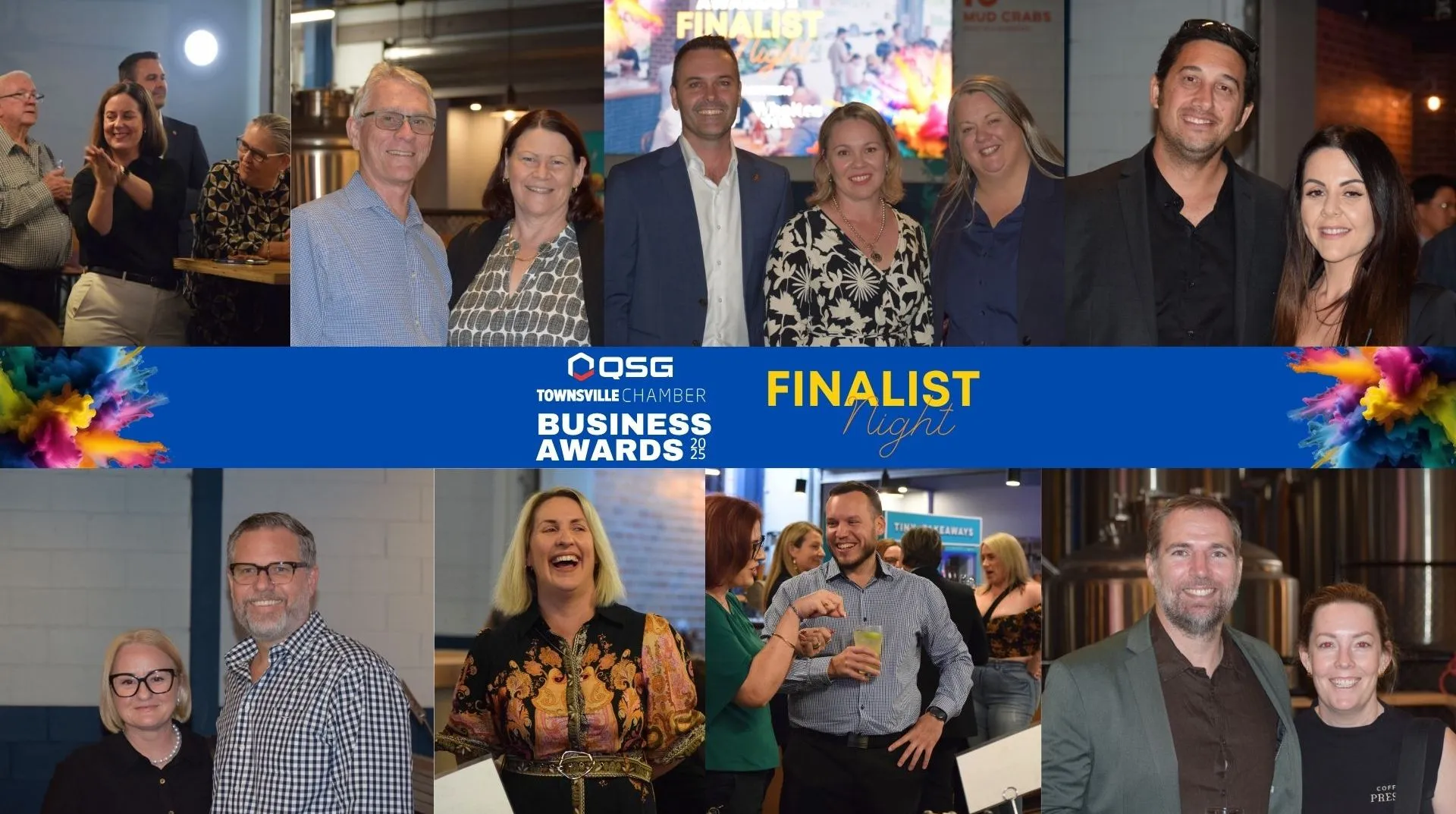
CHAMBERS CALL FOR ACTION TO IMPROVE INSURANCE AFFORDABILITY IN THE NORTH Townsville and Cairns Chambers of Commerce Meet with Federal Treasury on Cyclone Reinsurance Pool Review The CEOs of the Townsville and Cairns Chambers of Commerce met with representatives from Federal Treasury in Townsville this week to discuss the performance of the Cyclone Reinsurance Pool (CRP) and its impact on North Queensland businesses. Townsville Chamber CEO Heidi Turner said the Chambers welcomed the opportunity to provide local insights but remain concerned that the pool is not consistently improving insurance affordability or availability in northern Australia. “We’ve seen some positive movement in strata and small business policies under $5 million, but outcomes remain inconsistent, especially for domestic and commercial property insurance,” Ms Turner said. “The community is effectively paying twice: once through taxes (GST and then Stamp Duty), and again through insurance premiums that don’t reflect the reduced risk that the Cyclone Pool covers.” Key issues raised by the Chambers during the meeting included: Inconsistency across markets: Domestic and business premiums continue to rise, while strata and some business renewals (under the $5m cap for business) have seen only minor, inconsistent reductions. Limited coverage for SMEs: The $5 million asset threshold excludes most regional small and medium sized businesses and will prevent them from also benefiting from mitigation discounts due to be released in 2026. Low business participation: Only $20 million, just 2.7%, of the $717 million underwritten under the pool relates to business insurance, reflecting limited uptake and competition. Lack of insurer pass-through: With ACCC reporting reductions of up to 17%, and that not being the experience on the ground, there are concerns about whether savings are reaching consumers. No new commercial insurers: No new insurers have entered the market since the CRP began, Need for clarity and consistency: Definitions of “flood” differ between councils and insurers Mitigation efforts must reduce premiums: Currently there is no clear cost–benefit link between mitigation investment and premium reduction, mitigation at this stage just reduces the risk of the insurance industry. Ms Turner said the Chambers support the continuation of the Cyclone Reinsurance Pool, as it is still less than a year since the smaller insurers were required to join the pool, but believe legislative adjustments are essential for it to meet its objectives. “There have been excellent reviews and recommendations which have been produced based on inquiries and submissions made by many across the country, but we need to see action. Without reform, businesses will continue to face unsustainable premiums, or worse, operate uninsured while insurers report record profits,” Ms Turner said. Cairns Chamber CEO Patricia O’Neill called for greater transparency and stronger requirements for insurers to pass through savings to customers. “We need to ensure that any reduced risk to insurers translates into real relief for the people and businesses paying the premiums,” Ms O’Neill said. The Chambers, collectively representing over 1,000 businesses across North Queensland, will continue working with Treasury, insurers, and all levels of government to ensure fair, accessible, and sustainable insurance solutions for the region. WHAT'S NEXT We will be creating a submission that addresses these challenges to submit to Treasury, and welcome our members providing their experience around the affordability and accessibility of insurance and the impact on their business. Real business examples good or bad, adds weight to our submission and we welcome you to share your experiences with us. Please email members@townsvillechamber.com.au
Read More
WHAT A NIGHT! 350 people from our local business community out for a fun night of celebrating and elevating each other! Thanks to everyone who made it so memorable! And the winners of the QSG Townsville Chamber Business Awards 2025 are... BUSINESS OF THE YEAR – Sponsored by Pickerings Group of Companies Lamberts Fresh Produce SMALL BUSINESS OF THE YEAR – Sponsored by QSG Getbranded MICRO BUSINESS OF THE YEAR - Sponsored by Gripfast Consulting Bartlett Master Jewellers BUSINESS TRANSFORMATION – Sponsored by Ringers Western Tiny Mountain Brewery EMPLOYER OF THE YEAR – Sponsored by Malpara Florist St Patrick's College Townsville YOUNG BUSINESS PERSON OF THE YEAR – Sponsored by James Cook University Justin Bolgrer JB's Diesel & Mechanical EMPLOYEE OF THE YEAR – Sponsored by Optus Alana Hopkins Workforce Abundance RAISING REGIONS – Sponsored by The Ville Resort & Casino Powerlink Queensland SOCIAL RESPONSIBILITY – Sponsored by Powerlink Queensland Ronald McDonald House Charities North Australia
Read More
We're thrilled to announce the finalists for the 2025 QSG Townsville Chamber Business Awards! Congratulations to all nominees, the finalists this year are: BUSINESS OF THE YEAR Sponsored by Pickerings Group of Companies - Billabong Sanctuary - Cbar the Strand - Dentist at Healthlink - Harcourts Kingsberry Townsville - Lamberts Fresh Produce SMALL BUSINESS OF THE YEAR Sponsored by QSG - ANV Painting - Cohen Legal - Dentist at Healthlink - GetBranded - Townsville Office & Safety Supplies MICRO BUSINESS OF THE YEAR - Advantage Project Solutions Pty Ltd - Bartlett Master Jewellers - Coffee Presto - Hello Health - Whaites & Co BUSINESS TRANSFORMATION OF THE YEAR Sponsored by Ringers Western - AEP Engineering - Dentist at Healthlink - selectability - The Metropole Hotel - Tiny Mountain Brewery EMPLOYER OF THE YEAR Sponsored by Malpara Florist & Design Studio - AEP Engineering - Apricus Health - Belle Property Townsville - Coutts Redington Chartered Accountants - St Patrick's College Townsville YOUNG BUSINESS PERSON OF THE YEAR Sponsored by James Cook University - Jess Whaites from Whaites & Co - Johan Erickson from Empowered Recruitment - Jordan Jilg from Rummage Technical - Justin Bolgrer from JB's Diesel & Mechanical - Peter Mulligan from Channel Empowered Recruitment EMPLOYEE OF THE YEAR Sponsored by Optus - Alana Hopkins from Workforce Abundance - Kristy Dawes from Belle Property Townsville - Peta Mitchell from Cbar the Strand - Rebecca Hoffensetz from The Ville Resort-Casino RAISING REGIONS Sponsored by The Ville Resort Casino - Explore Property Munro & Co - Powerlink Queensland - Sealink - STEM Changemakers SOCIAL RESPONSIBILITY Sponsored by Powerlink - Alliance Clinics - Explore Property Munro & Co - Fuel for Schools - Ronald Mcdonald House - Towards Better YOUNG EMPLOYEE OF THE YEAR Sponsored by CQUniversity - Archie Arenson from ARN Radio - Elissa Alferez from Alliance Clinics - Monique Searle from The Ville Resort Casino - Shane Dempsey from AEP Engineering - Telissa Timpone from the Make-Up Mirror A huge thank you to all of our sponsors especially: Naming Rights Sponsor QSG Event partners KPMG and Waites + Co Join us for a night of celebration, recognition, and connection at this year's Awards night. Friday 8th of August, The Pavillion, The Ville Secure your seat
Read More
Are you a creative communicator with a flair for storytelling and a love for local business? We want you on our team. We are on the lookout for a dynamic, hands-on Marketing Communication & Events Officer to help us connect, advocate, inform and shine a spotlight on Townsville’s thriving business community. In this exciting role, you'll: > Craft compelling content across social media, newsletters and blogs > Coordinate standout events and impactful campaigns > Promote local business stories that matter > Work closely with our CEO and media partners > Be part of a passionate team making real change in the region Skills we’re looking for: > Strong writing and communication > Digital and social media know-how > Creative thinking and attention to detail > Event coordination experience a plus Applications close 5pm, Monday 21st July For more information about the role and how to apply https://www.townsvillechamber.com.au/about/career-opportunities/
Read More Townsville Chamber Cast
Townsville Chamber Cast

MEDIA RELEASE Townsville Chamber Welcomes Focus on Productivity, Crime, and Skills in State BudgetThe Townsville Chamber of Commerce has welcomed key measures in the Queensland State Budget handed down today by Treasurer David Janetzki MP, with a clear focus on core services, business productivity, and regional workforce challenges but it doesn't go far enough on tax reform Chamber CEO Heidi Turner, who is in Brisbane for the budget this week, said the 2025–26 Budget strikes a pragmatic balance, prioritising health, education, roads and community safety, while offering targeted support to small businesses doing it tough. “We’re pleased to see no new or increased taxes in this budget, and a clear commitment to improving productivity and workforce participation and we look forward to understanding how this funding will be delivered,” Ms Turner said.“In particular, we welcome investment in safety and crime prevention. It’s encouraging to see practical measures that respond to the needs of both business and community.” "This is the first year crime and safety has been a formal advocacy area for the Chamber, and we support the significant funding committed to prevention and deterrence,” Ms Turner said.Key highlights for NQ business include:> Continuation of the Regional Jobs Committees (RJC) for two more years, with the Townsville Chamber playing an active role in the NQ RJC to coordinate local workforce solutions.> Funding for Skilling Queenslanders for Work and a dedicated fund to help women return to the workforce, like the program the Chamber are currently running to help skilled women into employment.> A $130 million “Small Business First” action package including streamlined services, improved procurement access, reduced tape reduction and a support network offering financial counselling and business coaching.> A $1.6 billion investment in electricity maintenance, which the Chamber hopes will place downward pressure on power bills one of the largest expenses for small business.> Extension of the 50% apprentice payroll tax rebate for another 12 months.However, Ms Turner noted more is needed to support the businesses employing apprentices. > Significant investment into resources and critical minerals including $13m in new mineral exploration including the Queensland Common User Facility“While the 50% apprentice rebate extension is welcome, we remain concerned that businesses are being penalised when an apprentice’s wage tips them over the payroll tax threshold. We continue to call for a staged increase in that $1.3m threshold for payroll tax and a full exemption for apprentices and trainees,” she said.The Chamber also raised the ongoing need to address skills shortages, which continue to affect every sector.“We need to grow and retain our regional workforce, but this also requires investment in the people who deliver training, our teachers and trainers. Without them, progress stalls. Skills shortages are putting pressure on productivity, delivery timelines, and business viability especially for small businesses.”The Chamber welcomed the government’s ongoing commitment to the CopperString project and the $180 million Sovereign Industry Development Fund, aimed at building regional capabilities in key sectors such as defence, biomedicine, biofuels and tech."The certainty of the governments in investment in CopperString has already led to increased enquiries in office space in Townsville which is promising,"Finally, the Chamber is eager to learn how regional Queensland can leverage the Olympic and Paralympic Games spend.“This is the largest infrastructure investment in our state’s history. Townsville wants to ensure we benefit from the transport and legacy infrastructure, not just sporting projects,” Ms Turner said.“We’ll be watching closely to see where the $9 billion already announced for Bruce Highway upgrades will be directed to improve regional connectivity.”Ms Turner also noted a continuing area of concern for the local business community:“We’re still paying stamp duty on insurance—a tax on a tax—on what is an essential service. This continues to be a frustrating and unnecessary cost burden," she said.“We will continue to advocate for policies that reduce the cost of doing business, cut red tape, and remove unnecessary hurdles that prevent businesses from growing and thriving in North Queensland.”"Yesterday I highlighted to the Treasurer in person that this was a solid first budget but we will continue to advocate for the abolition of payroll tax and removal of stamp duty on insurance as inhibitors for growth," The Townsville Chamber remains committed to working closely with all levels of government to ensure regional businesses are well supported, productive, and positioned for long-term growth.
Read More
This week I received a passionate anonymous email in response to our recent updates on advocacy. While I don’t know who sent it, I want to thank them. Their words reflected the very real frustration, fatigue, and resilience so many small and medium businesses are feeling. The truth is, businesses are doing it tough and have been for years. Closures aren’t caused by one big problem but death by a thousand cuts: Payroll tax bracket creep Soaring insurance and energy costs Product price increases Red tape and compliance complexity Another minimum wage rise from July 1 And for some, concerns about their safety and property due to crime and antisocial behaviour Layer that with workforce shortages and global uncertainty impacting costs and international supply chains and it’s a lot. Yet in our conversations with members, yes there is frustration around the areas highlighted but I still hear optimism from people working 70+ hours a week, some not paying themselves minimum wage or super, yet still backing their business and their region. These are the real concerns we regularly take to decision-makers. We don’t pretend to have all the answers but we are here to represent business and influence change, and sometimes there is a photo. Over the past 18 months, we’ve built stronger relationships at every level of government. We’ve called out issues, offered solutions, and been invited into decision-making rooms. Change happens when we’re in the room not just continually shouting from outside (although there’s a time for that too). The Chamber is also a business, one that relies on membership fees and profit positive events to exist. The good news is we’ve been growing: Events are busier than ever, Sponsors are approaching us before we set event dates Members are stepping up to connect, contribute and support each other And more businesses are joining because they see value in a collective voice that’s being heard To the anonymous emailer thank you. I’d genuinely welcome a meeting with you and any of our members to listen, to learn and see where we can do better and continue to grow as individuals and an organisation. And to everyone else if you’d like to get more involved, we’d love to have you. Sponsor an event, host a workshop, join a working group — this is your Chamber. Nominations for the Business Awards close on Monday with applications due by 30th June, and our early bird gala tickets closing the same day. It’s going to be a fantastic celebration of local business and the people driving our region forward. (More about that here >> https://www.townsvillechamber.com.au/business-awards-2025/ ) We are only as strong as the people in our Chamber and this community is something special, thanks for being a part of it. Enjoy your weekend Heidi
Read More
CHAMBER LAUNCHES NEW PROGRAM TO EMPOWER SKILLED WOMEN The Townsville Chamber of Commerce is proud to announce the launch of the New Horizons Program — a new initiative designed to support skilled women in the region re-enter the workforce or transition into new career opportunities. Funded through the Queensland Government’s Skilling Queenslanders for Work program, New Horizons will provide tailored support to skilled women looking to update their skills, boost their confidence, and connect with potential employers. The six-week program is aimed at assisting women who are not currently working to their full capacity, whether due to career breaks, underemployment, or other barriers to participation. Townsville Chamber of Commerce President Miranda Mears said the program responds directly to the growing need for skilled workers across the region. "The largest current challenge for our members is finding and retaining a skilled workforce. We know that there are women in our community not working to capacity for a range of reasons, and this program is designed to help participants upgrade their skills, gain confidence, and connect with potential employers," Mrs Mears said. "We know attracting people to the region has its challenges, but there are skilled people in our community with the capacity to participate more. This program is an opportunity for the Chamber to help our members by increasing the participation of skilled and experienced workers." Townsville Chamber of Commerce CEO Heidi Turner said launching the program on International Women's Day highlights the significance of offering tangible outcomes for women. "International Women's Day is a celebration of women's achievements, but it's also a call to action. The New Horizons Program provides a practical pathway to help skilled women unlock their potential while addressing one of the most pressing issues facing our business community — workforce shortages," Ms Turner said. Chamber has recruited well-known local Verena Louise to deliver the program. "Verena Louise brings extensive experience and strong industry connections across our region. She will guide participants through practical skills training, personalised career coaching, and networking opportunities with local businesses - helping skilled women to unlock their potential and thrive in the workforce," said Turner. Expressions of interest are now open, and the first intake of participants set to commence in two weeks' time. Click HERE to submit an expression of interest and we will contact you within 2 workings days.
Read MoreLoading More...
All entries have loaded.

Connect with the Townsville Chamber and you connect directly with Townsville business.
Join Our Mailing ListWe acknowledge the Bindal and Wulgurukaba peoples as Traditional Owners of the land, seas and waterways on which we live, meet and work.









